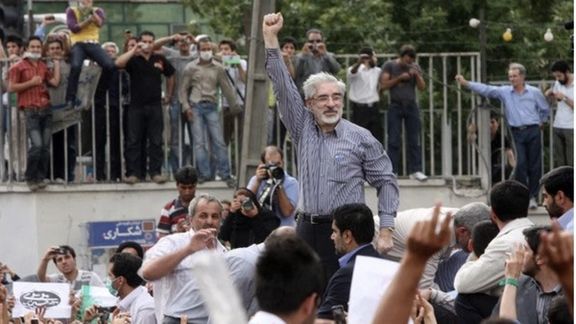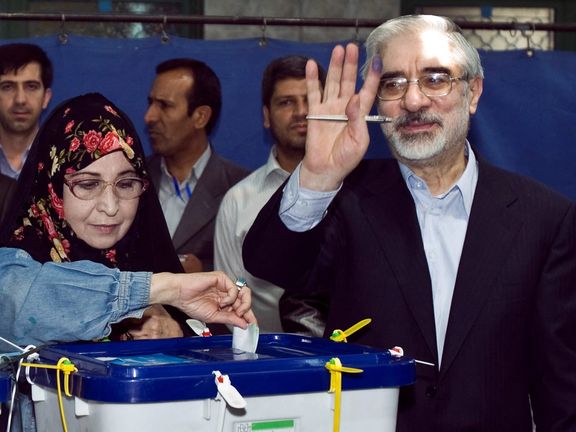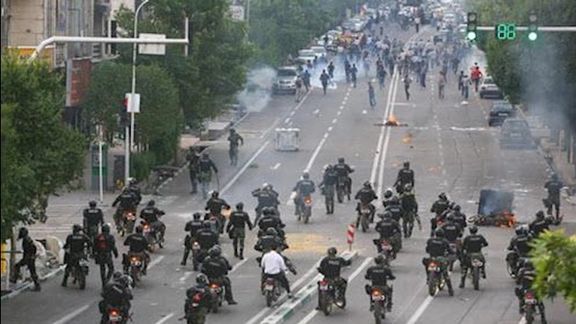Former Iran PM Turned Opposition Has Believers And Critics

The 2009 Green Movement leader Mir-Hossein Mousavi’s rejection of the reform option in the Islamic Republic has been met with admiration and antipathy alike.

The 2009 Green Movement leader Mir-Hossein Mousavi’s rejection of the reform option in the Islamic Republic has been met with admiration and antipathy alike.
In a rather short statement entitled “To Save Iran” Saturday, Mousavi who has been under house arrest along with his wife Zahra Rahnavard since 2011 underlined his recognition of the ‘Woman, Life, Freedom’ movement and called for a fair and free referendum to decide whether the present constitution should be amended or completely replaced.
He also called for elections to appoint a constitutional assembly to decide the future form of government as well as a further vote to decide whether the new constitution is acceptable to the people or not.
Such a referendum would very likely put an end to Velayat-e Faghih (rule of the Islamic jurist) which gives a cleric such as Ali Khamenei extraordinary powers including the power to overrule all elected bodies and officials and hence, people’s choice.
This comes in contrast to his position in 2009 when in a highly disputed election result he was denied the presidency running against the incumber Mahmoud Ahmadinejad. At that time although millions of people poured into the streets to support him, he refrained from seriously challenging the regime and its leader Ali Khamenei.
Mousavi admitted that he did not know who should decide to hold a referendum, since the current rulers would not, but called for cooperation among all political forces and figures who believe in preserving the country’s territorial integrity and non-violence to clarify these points.

“There were two types of reformists in Iran. Some neither desired nor thought it possible to overthrow the misery [caused by the clerical rule] and sought a share of power. A minority including Mir-Hossein Mousavi believed that the misery of the clerical rule was reformable and could evolve into democracy. Mir-Hossein Mousavi’s courageous new statement showed that he has given up the dream of reform,” US-based academic Abbas Milani tweeted.
Some reformists, including seven prominent political prisoners and over a dozen figures of the ‘religious intellectual movement’, and its mentor Abdolkarim Soroush, have welcomed his proposal, others have strongly rejected it.
Speaking to Iran International, Soroush said Mousavi’s supporters and opponent agree that he “bears a weight” that cannot be ignored.
The political prisoners who have supported Mousavi’s new move have said that they will do their best to advance his proposal to bring a “peaceful and non-violent transition to a completely democratic and developed Iranian structure."

Many of Mousavi’s opponents say as a former prime minister (1981-1989) he is responsible for much of the regime’s wrongdoings and atrocities including mass execution of thousands of political prisoners in 1988 and the Cultural Revolution to expurgate universities from Marxists and militant political groups such as the Mujahedeen-e Khalq Organization.
Arguing that Mousavi has never denounced the Islamic Republic’s founder, Ruhollah Khomeini and his ideology, and still admires him and his “golden era”, pro-monarchy journalist and activist Morteza Esmailpour said in a tweet that Mousavi himself should be put on trial because “the regime was always criminal”.
The prison executions were carried out based on a fatwa by Iran's then-supreme leader, Ruhollah Khomeini, against the MEK which carried out a wave of bombings in Iran and struck an alliance with Saddam Hussein during the 1980-88 war. “Showing mercy to those who take up arms against the Islamic government is being naïve,” Khomeini said in his fatwa.
In June 2010 Mousavi claimed, in a meeting with a group of journalists and political activists, that not only he, but also other top officials -- including the president, chief justice and the speaker as well as Khomeini’s designated successor Hossein-Ali Montazeri – were unaware of what was happening in prisons and blamed the prison purge on others including a former warden of the infamous Evin Prison Assadollah Lajevardi.
He also admitted that many of the prisoners who were executed had not committed any crimes or if they had, they were already serving their sentences. “We even knew some of them, from before the revolution and after that… They were poets, they were writers … They had not taken up arms,” he said.